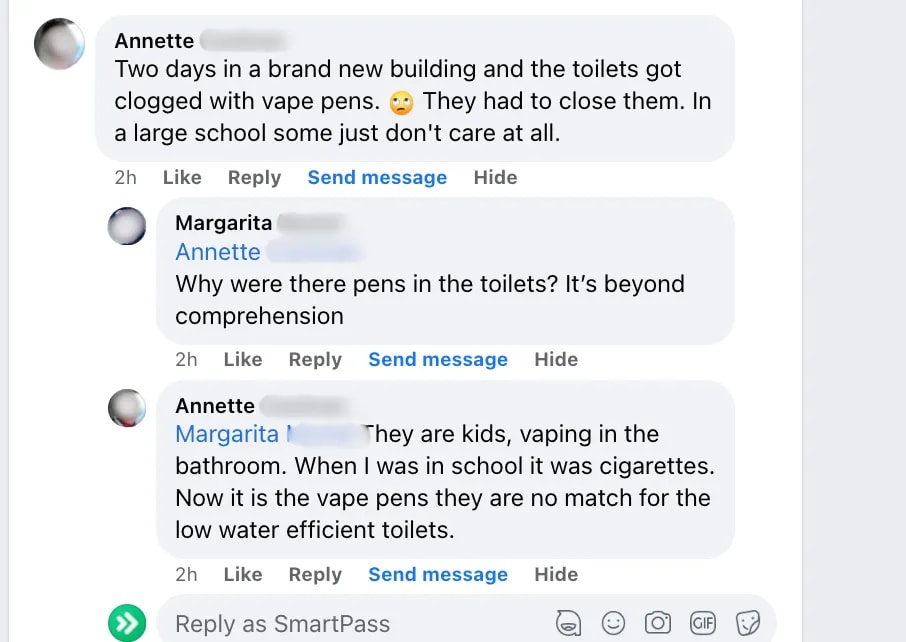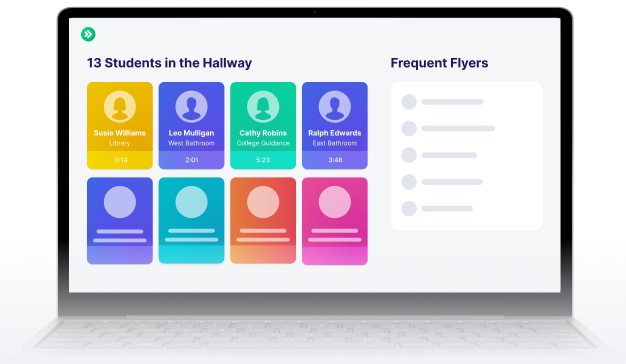In the News: Enhancing Safety in Schools Across Minnesota
Read the Story
SmartPass Co-Founders Listed on Forbes 30 Under 30
Read the Story

Lee Moskowitz
.avif)

One of the best ways to deter vaping and protect students from its negative impacts is to have honest and non-combative conversations about it. This can be tough, as the signs of vaping are harder to spot than other tobacco products.
As schools look at new ways to battle the vaping epidemic, the creative ways that students can hide their vapes make it increasingly difficult. Vaping is dangerous to student health and impacts the school’s resources and learning environment, so it’s not something that can be ignored. The question is, can teachers and school staff find the vapes that are hiding in plain sight?
With school policies and teachers working to prevent vaping, students have found ways to blend their vapes into the school day. Here’s how vapes may be hiding in plain sight as clothing, gear, or school supplies.
.gif)
Despite parents' and schools’ struggles to prevent vaping, the nationwide trends are encouraging. The FDA’s most recent report on tobacco use among middle and high school students shows the lowest level of vape use in a decade, with just 5.9% reporting current use of e-cigarettes in 2024. This is down from 7.7% just last year.
The rates are higher in high school than middle school and many reported e-cigarette users vape frequently. Over a quarter reported using their e-cigarette daily and more than a third said they used it 20 out of the previous 30 days. This means that schools need to remain vigilant and consistent in their work to prevent vaping in school.
Vaping and nicotine addiction carry big risks for students. Along with nicotine, e-cigarette aerosols can also contain heavy metals, VOCs (volatile organic compounds), and cancer-causing chemicals. These can cause respiratory issues, lung damage, and decreased mental health. Research also indicates that nicotine use can harm brain development and lead to lower learning outcomes.
While vaping is often promoted as a “healthier” alternative to traditional cigarettes, there are flaws in that argument. First, scientists and doctors are still learning the long-term impacts of vape use. Second, vaping isn’t limited to people who were already smoking. In fact, more than 50% of the 15–17-year-olds who reported using JUUL in 2019 to Truth Initiative had never tried combustible tobacco.
That means the risk is reaching students who were not at risk for smoking. There’s also evidence that using e-cigarettes can make someone 3.6 times more likely to eventually try typical cigarettes. That means it may be increasing smoking risks, rather than lowering them. Additionally, adolescent nicotine use can increase the risk of future addiction to other drugs.
In 2019, the new “Tobacco 21” legislation increased the national minimum age for the sale of tobacco products, including e-cigarettes, from 18 to 21.
It was an important step, but students who do vape now have to find more undercover ways of obtaining supplies, often by word of mouth or through social media. This adds to the health risks, as cartridges may contain even more harmful substances and suppliers can’t be held accountable as easily.
Vaping has been shown to decrease focus and impact learning outcomes. It may also increase the amount of classroom time students miss, whether from skipping class to vape, illness, or consequences like suspension or detention. Nicotine use and addiction can escalate impulsivity, impact mood, and hurt mental health, which can make for more negative behaviors in the classroom.
These behavior issues and negative learning outcomes add to the stress in and out of the classroom for all students and teachers. It takes time away from instruction and requires additional resources to monitor for prevention and bridge any gaps that are created. Health services and counseling are essential supports for students facing health impacts or working to break free of an addiction, but they can often be in short supply.
Overall, issues like vaping that tap into social acceptance along with addiction can snowball quickly for schools. Prevention and a good plan are important!
Some schools even need to close down bathrooms or tap into funds to repair plumbing from flushed vapes!

Taking a preventative and educational approach is one of the more effective ways to combat the dangers of vaping among students. Schools should involve the community in the process—ensuring a holistic approach—withclear expectations and consistent consequences. Involving students in the process of setting up school policies helps with communication and increases student autonomy and accountability. Plus, peer support and accountability can be a powerful tool.
E-cigarette companies often advertise and design products in ways that seem designed to reach students. Another powerful influence on student nicotine adoption and student knowledge of and access to hidden or standard vape supplies is social media, both public accounts and students’ social circles.
Education that shares more on the risks and unknown elements of nicotine use and vaping can give students the information they need to make more informed decisions or push back against peer pressure. The FDA’s report indicated they believe that the increased public education campaigns play a big role in the continued decline of vape use among middle and high school students. They also share resources to help teachers and parents during conversations with students about vaping.
It’s important to have clear policies and take a compassionate and collaborative approach to addressing vaping with students, just like any challenging student behavior. Teachers and staff should make sure they have a clear view of the situation, lead with conversation, focus on solutions, and aim for positive resolutions.
Shaming usually doesn’t work, but there are great strategies to set up school expectations, manage transitions, praise success, and pick the most important battles so that monitoring, detection, and enforcement don’t take over a school environment. School administrators can support all of this by leading the movement, finding helpful resources, and bringing in the right technology and tools.
With staff and teachers already juggling a long list of responsibilities and vape trends and technology that change quickly, bringing in the right technology to help boost monitoring and enforcement is important. The goal is to find an effective and efficient round up of tools that work well together, are simple to integrate into the school day, and make an impact.
Because students vaping in the restroom and common areas is so common, most schools turn to vape detectors first. These are devices mounted to the ceiling that detect the particles and chemicals typically associated with vaping aerosol. While they are not perfect, they will alert school staff to a vaping event and provide helpful school-wide data on the frequency of vape use. They do not, however, tell staff which students are likely associated with the event. To fix that, they’re often paired with cameras or student movement management tools like SmartPass.
SmartPass’s digital hall passes provide the data to show which students were not in class and may be tied to frequent vaping incidents. That data can help in monitoring and policy implementation, while other SmartPass features like encounter prevention, total pass limits, and pass time limits can help with prevention. Even better, SmartPass offers this increased data collection and the ability to watch for potentially problematic behavior trends while taking admin time and mental load off teachers’ plates.
The good news is that more than 60% of students who smoke or use e-cigarette reported wanting to quit or having tried to quit. Addiction isn’t an easy thing to overcome, but vigilant and supportive parents, teachers, and school staff can help students with this important journey. Vaping is hard to catch and consequences often aren’t as effective as people think at shifting behaviors, especially with addiction. Plus, teachers and staff are overstretched and can’t monitor all students, all the time.
That’s why awareness for students and parents, the right proactive behavioral strategies, and a positive school environment make such a big impact in the work to keep vaping out of schools and away from student’s lives.
Teachers, administration, and school staff should be sure to build relationships and hold intentional conversations, connect with organizations that offer support and educational materials, and keep up with tools and best practices as vaping products and trends evolve. And reach out to our team at SmartPass about how our digital hall passes can help keep the day running smoother and safer for everyone in your school community!


.jpg)
